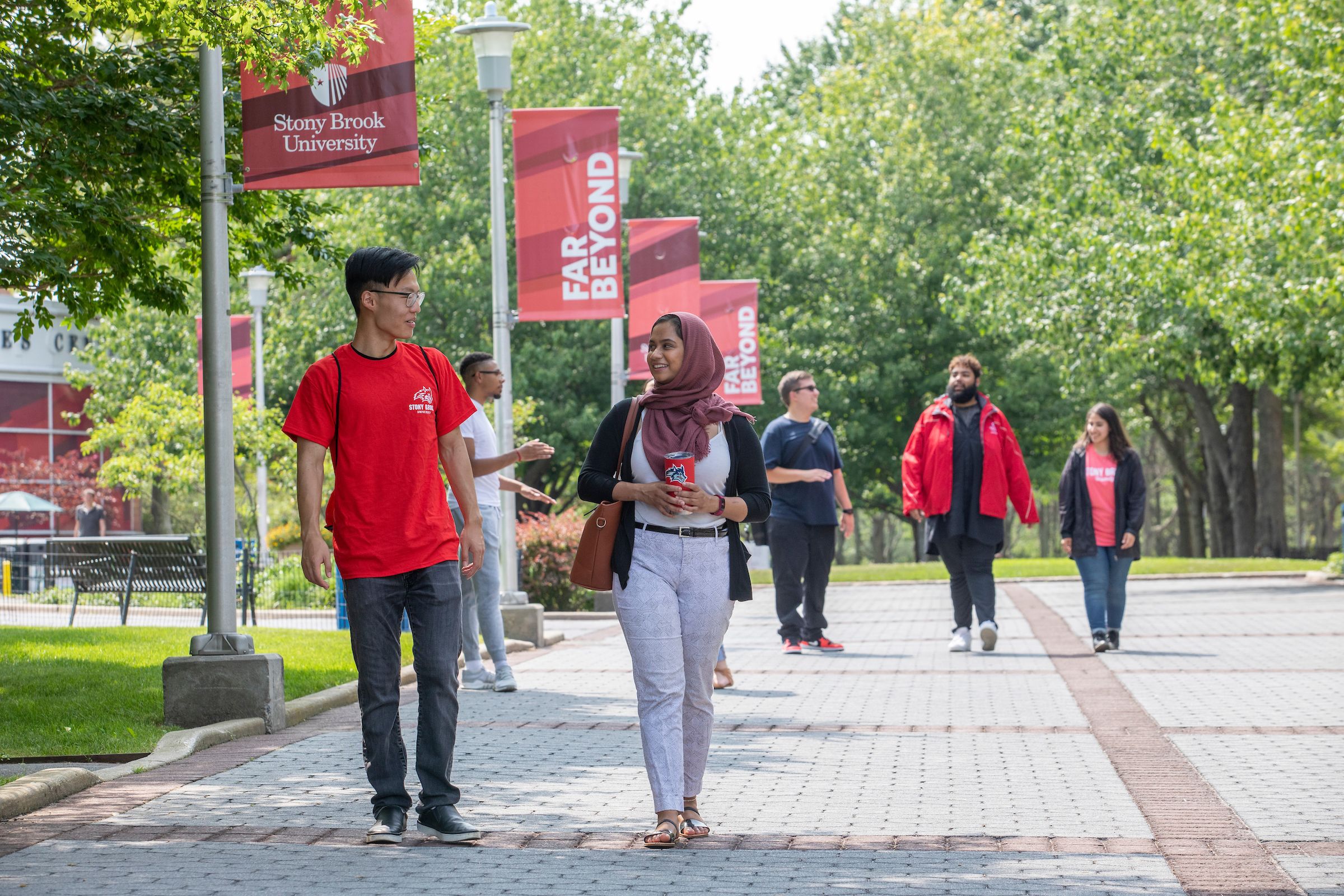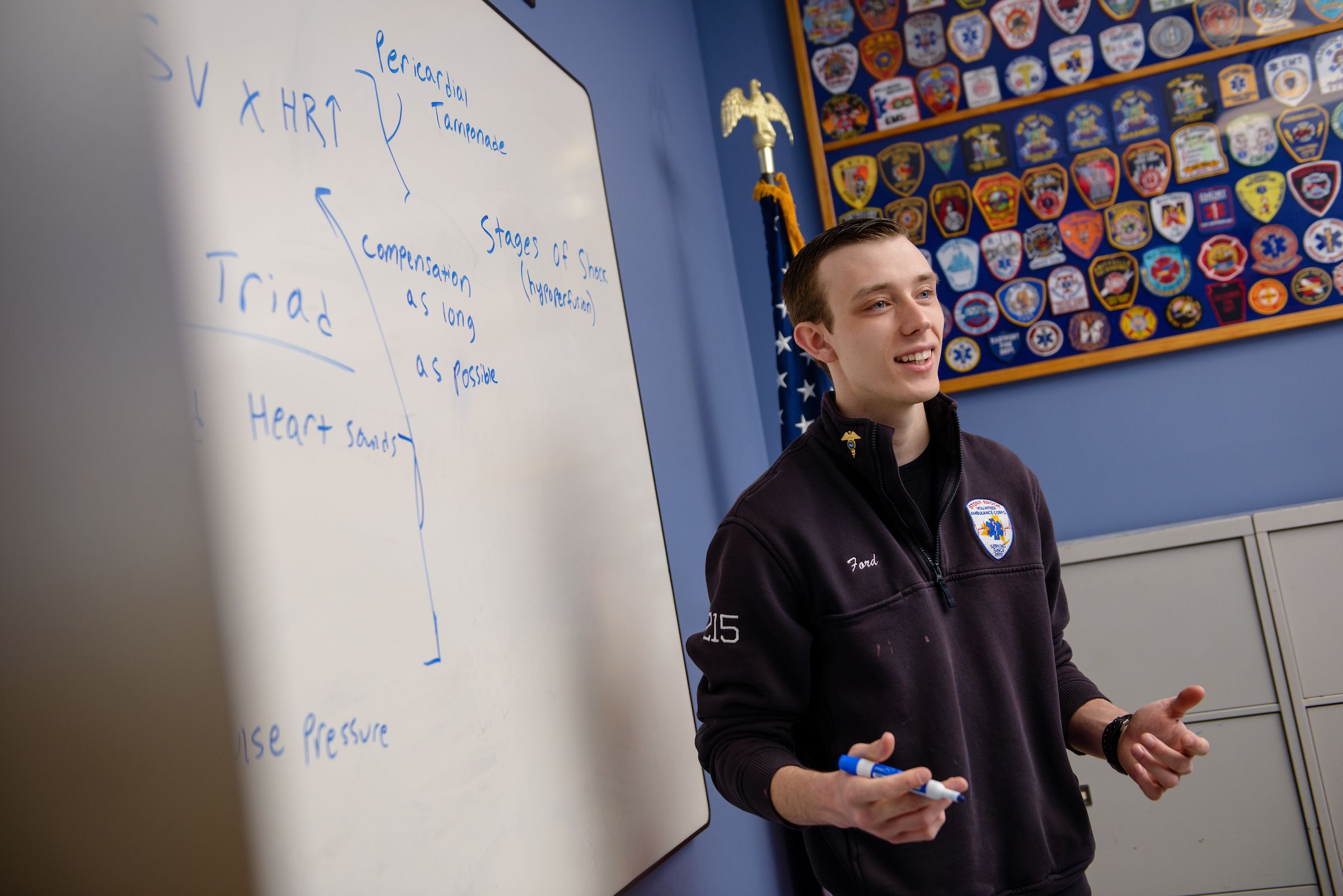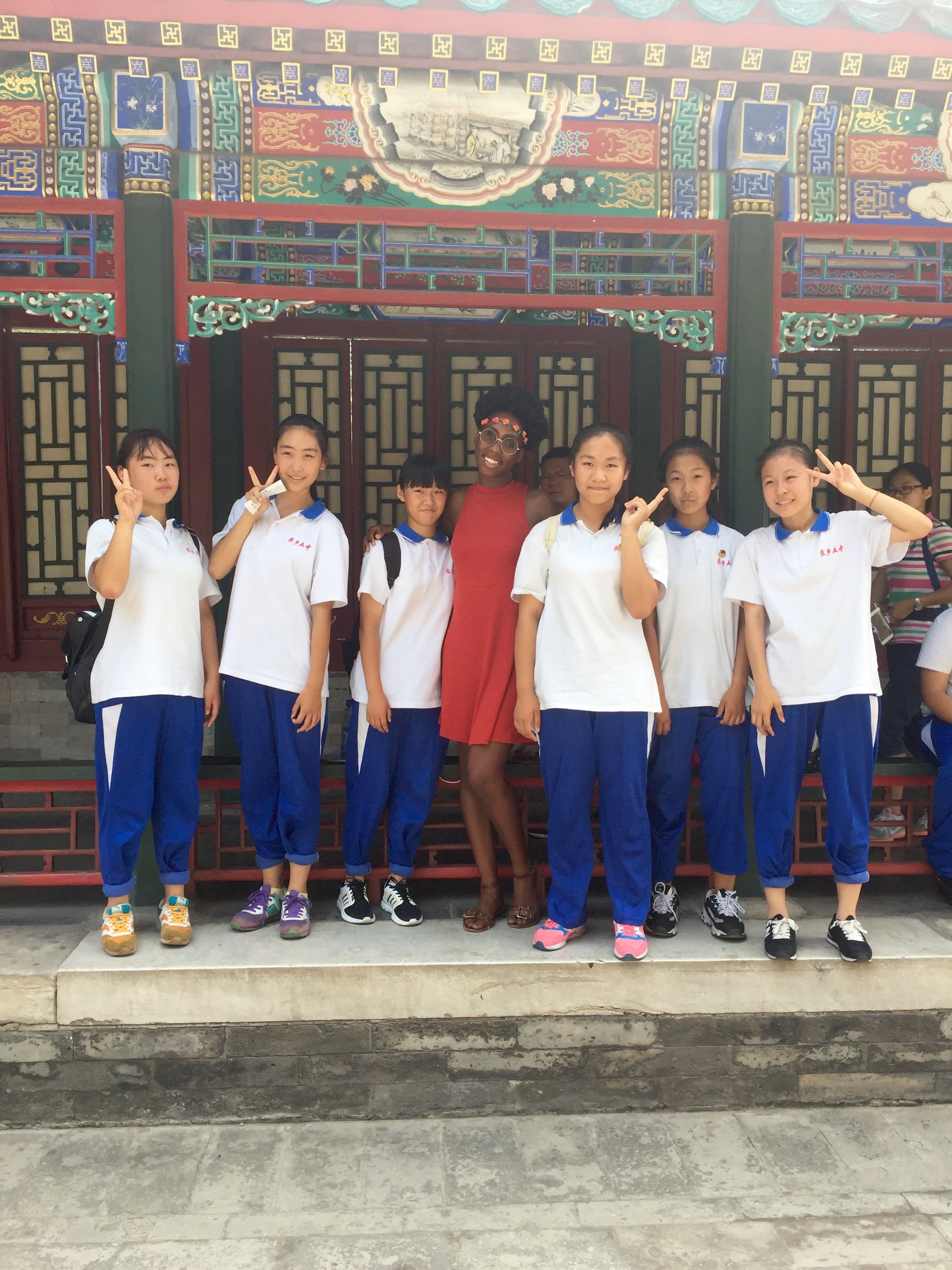Stony Brook Accelerates Life-Changing Trajectories for Disadvantaged Students
A Powerful Combination of Financial, Academic and Emotional Support Offers Students the Tools They Need to Thrive and Succeed

Shane Ford is not sure where he would be today if he had not entered Stony Brook University as a freshman in fall 2013. During high school, Ford lived with his unemployed father in an apartment in one of Long Island’s most economically distressed areas.
His parents were divorced. His mother, who lived in Florida, worked a minimum-wage job. His older brother was battling addiction. No one in the family had gone to college.
Despite it all, Ford took a heavy load of advanced-placement courses, maintained a high school GPA above 4.0, was involved in extracurricular activities and read medical journals in his spare time.
“School was always a place I felt in control, and I felt I was doing well,” Ford says. At the suggestion of a high school counselor, Ford applied for a full scholarship from a local foundation that annually makes such awards for nearby Stony Brook, one of the nation’s top research universities. He won the scholarship.
Making Dreams Come True
Ford graduated from Stony Brook with a bachelor’s degree in biochemistry in spring 2017 and a master’s in biochemistry and cellular biology in fall 2018. He is now a first-year medical student at the Mayo Clinic Alix School of Medicine — putting him well on his way to a career that combines his passion for biology with his desire to help people. It also holds promise for a more stable financial future.
“Honestly, it’s hard for me to imagine that I’ll be in a higher pay bracket,” Ford says. “For my future family, though, I’m ecstatic. I am so happy that I’ll be able to provide my kids with whatever they need and give them ample opportunities to pursue their passions and do the things they enjoy.”
Leader in Social Mobility
Ford is just one of the many students that Stony Brook is propelling up the socioeconomic ladder. As a leader in social mobility, Stony Brook helps academically talented, yet financially disadvantaged, first-generation college students and underrepresented populations excel further and faster than its peer institutions.
Roughly a third of Stony Brook’s almost 18,000 undergraduates receive Pell Grants, and more than one-third are first-generation students. Pell Grant recipients at Stony Brook graduate at higher rates than non-recipients. There’s a 76.3 percent six-year graduation rate for Pell recipients vs. 72.5 percent graduation rate for non-recipients.
“The key has been our ability to help students see themselves as capable of changing their future and not being bound by their past,” says Charles Robbins, Stony Brook’s vice provost for undergraduate education. “We do it for all students, but these students in particular gain from it.”
A study by the Stanford Institute for Economic Policy Research ranks Stony Brook among the top 10 colleges and universities in the nation for creating a proven path of upward mobility. Fifty-one percent of Stony Brook’s students from the lowest quintile of income distribution make it to the top economic quintile.
Stony Brook’s multidimensional support makes it three times more effective than Ivy League schools such as Harvard at promoting its students’ rise up the socioeconomic ladder, according to the study. As such, it has in essence closed the gap between white students and underrepresented minorities, and the University’s six-year graduation rates bear this out: 72.5 percent for black students, 72.5 percent for white students and 71.2 percent for Hispanic students.

Shane Ford ’17, ’18 is now a first-year medical student at the Mayo Clinic Alix School of Medicine.
Shane Ford ’17, ’18 is now a first-year medical student at the Mayo Clinic Alix School of Medicine.

One of Ford’s supervisors in the campus volunteer ambulance corps became his “best mentor” and helped him to prioritize college life’s demands.
One of Ford’s supervisors in the campus volunteer ambulance corps became his “best mentor” and helped him to prioritize college life’s demands.
Personalized Approach
The University’s personalized approach is what’s helping students thrive, beginning with effective outreach and recruitment, and continuing throughout the entire college journey, in mentoring, advising, and academic support. The University’s faculty and staff go beyond academic connections to also provide emotional and social support to students.
In fact, Ford describes one of his supervisors in the campus volunteer ambulance corps as his “best mentor.” Ford met his supervisor early in his freshman year when he joined the program, which he stayed with throughout his time at Stony Brook. Ford says the instructor helped him to prioritize college life’s demands. “He is still someone I reach out to for advice,” says Ford.
Like many students, Ford experienced a drop in grades his freshman year. He had planned to go to medical school, but at the end of his first year, he had a 2.75 GPA — well below 3.65, the average GPA of accepted candidates. He told his academic advisers that he should abandon his dream. Rather than agree, the advisors discussed the level of coursework and grades needed to strengthen his prospects for medical school. “They told me it absolutely was worth still pursuing and advised me on the grades and research experience I should be shooting for,” Ford says.
That summer, feeling renewed motivation, Ford heard about a lab that was accepting students with little or no experience. He went through two rounds of interviews and earned a spot in the lab of Jun Chung, an associate professor in Stony Brook’s Department of Pathology, studying breast cancer metastasis. For four years, Ford worked in the lab three to five days a week, during which he took advantage of valuable opportunities to learn new techniques and assume leadership roles.
“That experience has been invaluable,” Ford says. “Medical schools highly value research experience in their applicants, and it gives me the opportunity, now that I’m in medical school, to enter a lab and hit the ground running.”
Training a Future Diplomat
Just as Stony Brook has propelled Ford toward medicine, it has positioned Lydia Senatus to land her dream career. She graduated from Stony Brook in May 2018, with a major in economics and a minor in international studies and business management. She aspires to become a U.S. diplomat with a focus on East Asia, the Middle East, and East Africa.
“I give SBU much credit for getting me to where I am today,” says Senatus. “Without SBU, I would not even have known how to get into the career that I am passionate about.”
Senatus’s parents came to the United States separately from Haiti more than 40 years ago, and she grew up in Brooklyn. She applied to Stony Brook through the Educational Opportunity Program (EOP), a state-funded program designed for economically disadvantaged students with strong academic potential. When a Stony Brook representative called to tell her she had been accepted, Senatus saw it as a positive sign. “That act made me feel desired because one of the EOP counselors took the time to reach out to me,” Senatus says.
Jump-start on College
EOP requires students to participate in a two-month summer program, designed to give them a jump-start on the college experience. Jarvis Watson, interim chief diversity officer and a former assistant director of Stony Brook’s EOP (locally named EOP/AIM for Educational Opportunity Program/Advancement on Individual Merit), remembers Senatus arriving on campus. “Many students come in with a certain amount of shyness,” Watson says, “but that only lasted about four or five weeks with Lydia. She took off like a rocket.”
Over the years, Senatus joined the Women’s Leadership Council, a mentoring program that pairs outstanding female undergraduates with accomplished female professionals. Senatus was involved in student government as well as various councils and committees, which helped her build relationships with students, administrators and faculty members.
Several professors in the Department of Africana Studies became mentors, frequently taking time to talk with her about their courses. “I was interested in learning more, and through conversations, I developed academic relationships with them,” she says.

“Without SBU, I would not even have known how to get into the career that I am passionate about,” says Lydia Senatus ’18.
“Without SBU, I would not even have known how to get into the career that I am passionate about,” says Lydia Senatus ’18.

At Beijing’s Summer Palace, Senatus helps Chinese students practice their English.
At Beijing’s Summer Palace, Senatus helps Chinese students practice their English.
Fellowship and Scholarship Guidance
From her sophomore year on, Senatus worked closely with Jennifer Green, Stony Brook’s external scholarships and fellowships adviser, to find opportunities in international relations. Green gave advice on writing essays and, when necessary, connected her with other professors and advisers for guidance. The Career Center helped her practice for interviews.
Senatus credits Green with helping her successfully compete for the Benjamin A. Gilman International Scholarship, an award sponsored by the U.S. Department of State that enabled Senatus to study abroad in China. Green also helped Senatus through some tough times when she needed moral support and encouragement.
“Jennifer’s continuous support and dedication not only helped me in my academic and professional career but also helped my confidence and overall self-esteem,” Senatus says.
Empowering Student Success
In 2018, Senatus became the first Stony Brook student ever to win the prestigious Charles B. Rangel International Affairs Fellowship, which supports extraordinary individuals seeking a career in the U.S. Foreign Service. Funded by the U.S. Department of State and managed by Howard University, the award provides $95,000 over two years for a master’s degree in international affairs and two related internships.
Senatus is now beginning her second and final year of her master’s in international economics and conflict management at the Paul H. Nitze School of Advanced International Studies at Johns Hopkins University. As a Rangel fellow, she will be sworn into the U.S. Foreign Service after successfully completing her graduate studies.
“Stony Brook understands where our students are coming from and that time is limited,” says Watson. “We tell them and show them that we are here for them, and we want to see them succeed.”


